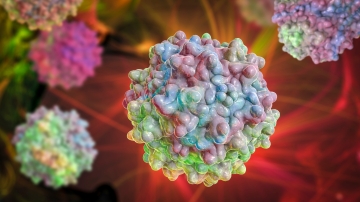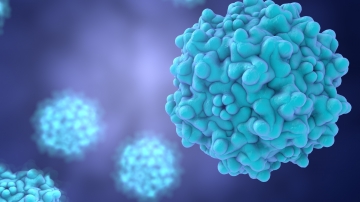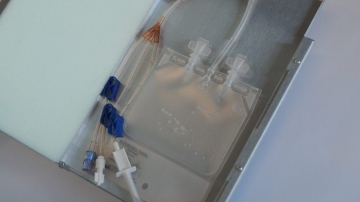Filling, Filtering & Dispensing mRNA
Table of contents
ShowAdvancing fluid management with single-use technology
Fluid management is a cornerstone in mRNA manufacturing and therapeutics, where maintaining product quality and safety is of utmost importance.
Advances in mRNA technology have revolutionized the field of biopharmaceuticals, particularly in the development of mRNA vaccines, like the Covid-19 vaccine and therapeutics for cell therapy or gene therapy. As the demand for messenger RNA-based products continues to rise, efficient fluid management plays a crucial role in ensuring the high-quality production of mRNA drug products.
This article is about challenges and the latest advancements in fluid management techniques, focusing on filling, filtering, and aliquoting mRNA during the manufacturing process.
Challenges in fluid management of mRNA
Fluid management of drug substances presents several challenges in mRNA production. Handling and maintaining the quality of biologics throughout the manufacturing process can be complex. Proper control of more technical fluid parameters, such as temperature, pressure, and flow rates, is crucial to ensure the integrity and stability of RNA drug substances.
Dispensing the exact amount of liquid is an important aspect in filling mRNA. Small-volume single-use bags are often mixed with just an additional solution and given directly to the patient - the amount of active ingredient in the single-use bag is therefore crucial for the health of the patient.
Another significant risk during fluid management is contamination, potentially compromising the quality and safety of mRNA drug substances. Maintaining aseptic conditions, implementing proper cleaning and sterilization procedures, and utilizing high-quality materials are essential to mitigate contamination risks.
Furthermore, filling processes must adhere to stringent GMP or cGMP guidelines including Annex 1 defined by the Food and Drug Administration (FDA) to ensure the highest level of safety, quality, and efficacy of mRNA drug substances. Compliance with cGMP requires robust documentation, validation of equipment and processes, and thorough quality control measures.
Finally, scalability is an issue for commercial production - as demand for mRNA products increases, the scale-up of fluid management processes becomes crucial. Scaling up vaccine production from clinical trials to commercialization while maintaining consistent product quality and meeting regulatory standards can be challenging. When scaling-up mRNA production it is also important to consider the associated RNase contamination.
At Single Use Support, we have been working intensively for years on safe and efficient handling of bulk drug substances. Our modular automated aseptic filling platforms are leading fluid management technologies in all processes during vaccine manufacturing. Note, that our area of responsibility lies before the final fill-finish into vials.
Dispensing of mRNA into bioprocess containers
Filling mRNA into suitable bioprocess containers ensures in best cases precise dosing during manufacturing. Various techniques, including automated systems, are employed to achieve optimal filling accuracy.
The modularity of the filling systems from Single Use Support allows quantities to be dispensed according to the individual requirements from the respective area. mRNA can be filled precisely in the milliliter range with RoSS.FILL Lab Scale. We can fill very small bags with filling volumes from 3mL to 100mL with a flow sensor (measures the flow of liquids) - and from 20mL with gravimetric technology (measures the filled bags on scales).
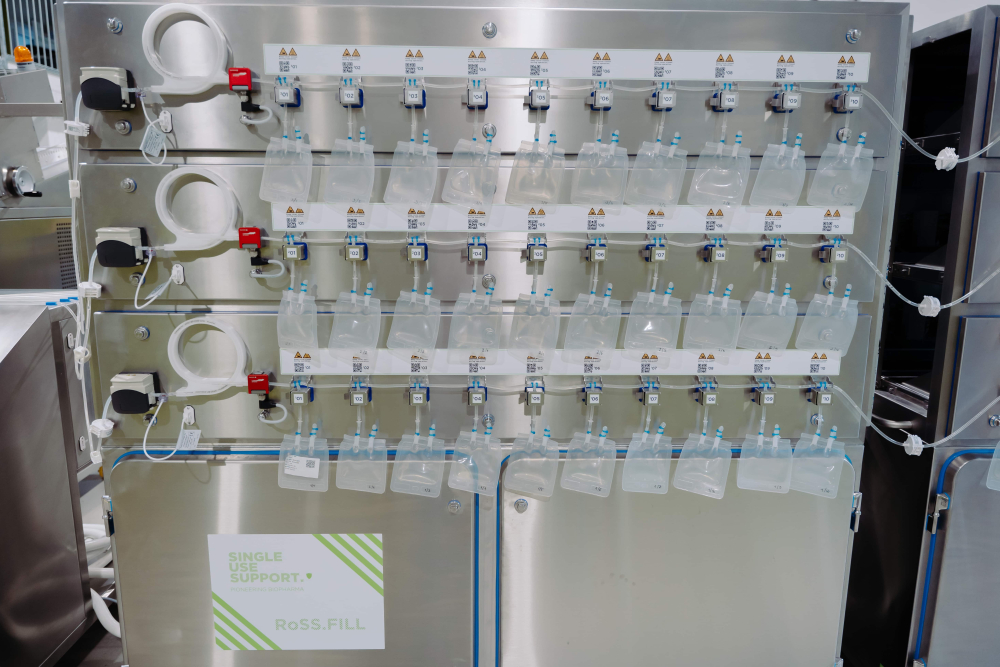
An aseptic filling approach is necessary because mRNA products must remain sterile until they reach the patient. Any contamination during the filling process could compromise the effectiveness of the drug and pose a significant risk to patient safety.
Automation helps to reduce risks of deviations in the aseptic filling process. Human intervention is often the biggest risk factor for contamination. Despite stringent protocols and cleanroom environments, with open manual handling there's still a risk of human error, even when operators are highly trained.
The introduction of closed systems has revolutionized aseptic filling processes, offering a solution to minimize the risk of contamination. A closed system is an aseptically sealed environment that ensures mRNA therapeutics are produced, filled, and sealed without exposure to the external environment. This significantly reduces the risk of contamination.
mRNA Filtering Methods
Filtration is a critical step in mRNA production to remove impurities and contaminants. Different filtration methods, such as depth filtration and membrane filtration, are employed to achieve high-quality mRNA. Rigorous quality control measures and adherence to regulatory guidelines, including cGMP regulations, are crucial during filtration.
With the recently effective regulation of Annex 1, PUPSIT (Pre-use Post Sterilization Integrity Testing) is also recommended for additional assurance of the highest quality and contamination-free performance.
In addition, filtration and purification is a also a big challenge in RNA associated therapies, such as oligonucleotide manufacturing, where it can reduce manufacturing yield drastically.
Advances in mRNA-Manufacturing Fluid Management
Recent technological advancements in biotechnology have further enhanced fluid management in mRNA production, contributing to the overall efficiency and quality of the process.
Advances through single-use technology
Single-use technology offers scalability, safety, and consistency in managing fluids in mRNA manufacturing. With the utilization of single-use bags, the risk of cross-contamination is significantly reduced, and the scalability of the production process is improved. It also provides the additional benefit of decreased downtime as cleaning and validation of reusable equipment is no longer needed.
Read more about single-use technology in mRNA manufacturing
Automated, Closed Systems
Automation plays a vital role in fluid management by reducing human error and increasing throughput. Automated, closed systems have gained prominence, offering benefits such as improved process control, reduced contamination risks, and enhanced scalability. These systems integrate seamlessly into mRNA manufacturing, enabling precise fluid management throughout large-scale production.
Quality Control and Monitoring Systems
Real-time monitoring and advanced quality control systems are crucial for ensuring product integrity and consistency during fluid management. Continuous monitoring of critical parameters allows for immediate detection and correction of any deviations. These systems contribute to the production of high-quality mRNA, meeting regulatory requirements and ensuring patient safety. Solutions from Single Use Support meet the requirements of 21 CFR part 11 by documenting all data electronically and providing automated reports.
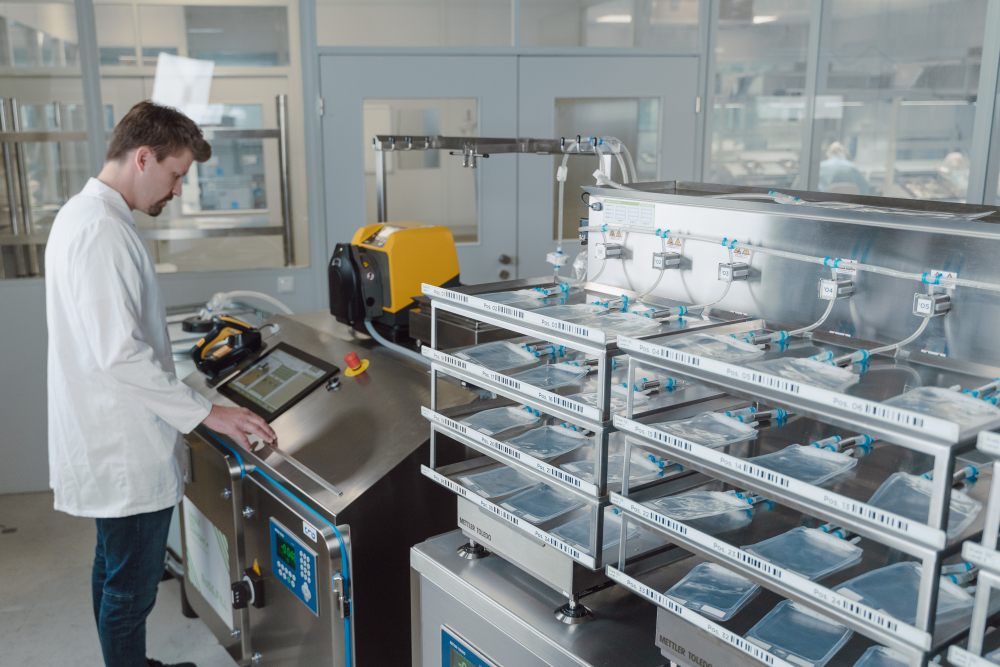
Solutions for mRNA Filling and Fluid Management
Single Use Support offers customer-oriented solutions specifically designed for efficient fluid management in mRNA manufacturing. The end-to-end solutions ensure that the filling process is not only efficient but also precise, accurate, and secure, addressing cGMP requirements.
Centerpiece is an automated and modular fill & filtration system that leverages single-use technology to provide a closed, aseptic environment for filling processes. This solution eliminates human error and significantly reduces the risk of contamination.
The filling of mRNA or lipid nanoparticles (LNPs) is fully automated via the RoSS.FILL platform, distributed by single-use assemblies into single-use bags, which are protected in single-use shells. During the filling process, speed and pressure can be controlled and specifically set. By means of RoSS.PADL additional homogenization and temperature control is possible.
Filling mRNA in single-use bioprocess containers is the initial point for further stages in the manufacturing process such as freezing, storage or transport of the single-use bags safeguarded in a single-use shell.
By investing in advanced fluid management solutions from Single Use Support, pharma manufacturers or CDMOs can better equip themselves to navigate the rapidly evolving landscape of mRNA therapeutics. As the industry continues to advance, the importance of efficient and safe fluid management will remain a central focus of successful and safe mRNA manufacturing.
FAQs about fluid management in mRNA production
Why is aseptic filling necessary in mRNA manufacturing?
Aseptic filling is necessary in mRNA manufacturing to maintain the sterility of the mRNA products. mRNA products need to be kept sterile from the point of manufacturing till they reach the patients, and any contamination could affect the effectiveness of the therapy and pose significant risk to patient safety.
How does a closed system minimize the risk of contamination during aseptic filling?
A closed system minimizes the risk of contamination during aseptic filling by providing an aseptically sealed environment that ensures mRNA therapeutics are produced, filled, and sealed without exposure to the external environment. This drastically reduces the potential avenues of contamination.
How does single-use technology improve fluid management in mRNA manufacturing?
Single-use technology improves fluid management in mRNA manufacturing by reducing the risk of cross-contamination, offering improved scalability and flexibility of the production process.
How does contract manufacturing support mRNA production?
Contract manufacturing enables the efficient production of mRNA-based products. Specialized companies with manufacturing capabilities partner with pharmaceutical companies, providing expertise, infrastructure, and resources for large-scale mRNA production. These partnerships ensure timely and reliable supply of mRNA-based healthcare solutions to meet global demands.
How does mRNA contribute to healthcare?
mRNA (messenger RNA) plays a crucial role in healthcare through its potential to develop vaccines and therapies. mRNA vaccines, like those for COVID-19 pandemic, utilize mRNA to instruct cells to produce viral antigens, triggering an immune response. mRNA also holds promise for personalized medicine and cancer treatments.







